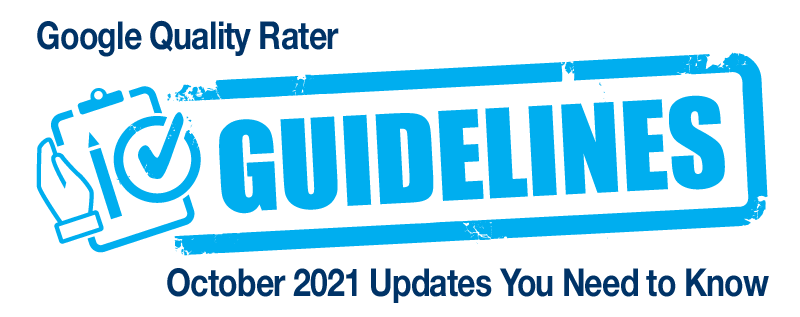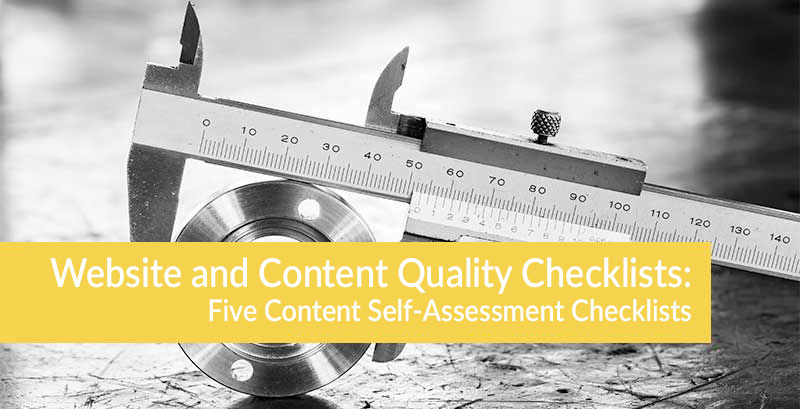Learn how the latest Google Quality Rater Guidelines impact your YMYL website
For YMYL websites such as health, wellness, nutrition, and supplement sites, the Google Quality Rater Guidelines provide insights into what Google expects from your content.
The top SEO priority for YMYL websites is to follow and comply with the Google Quality Rater Guidelines.
The Google Quality Rater Guidelines are used to evaluate the quality of search results. Google’s search quality raters are real people who use these guidelines to make sure the search results display relevant content from reliable sources.
As a wellness or nutrition brand, it’s important you know what the Google Quality Rater Guidelines state about E-A-T and YMYL websites.
Google says this about its Quality Rater Guidelines:
These guidelines are more than 160 pages long, but if we have to boil it down to just a phrase, we like to say that Search is designed to return relevant results from the most reliable sources available.
We want you to pay attention to the bolded content in the sentence above – relevant results from the most reliable sources available.
This matters to your YMYL website – you need to prove to Google and their search quality raters that your website is an expert and trustworthy authority on your subject matter.
Google holds YMYL websites to higher standards for expertise, authoritativeness, and trustworthiness (E-A-T) than non-YMYL websites.
Keep reading to learn:
- What a YMYL website is
- What the Quality Rater Guidelines are
- What a search quality rater is
- The importance of information quality for YMYL websites
- E-A-T for YMYL websites
- Google Quality Rater Guidelines action items for YMYL websites
What is a YMYL Website?
A YMYL website is a website that sell products or provide services or information that can impact the happiness, health, financial stability, or safety of users.
YMYL stands for Your Money Your Life.
Google categorizes the following websites as YMYL sites:
- News and current events
- Civics, government, and law
- Finance
- Shopping
- Health and safety
- Groups of people
- Other (fitness and nutrition, housing information, choosing a college, finding a job, etc.)
In section 2.3 of the Google Quality Rater Guidelines, Google says this about their rating standards for YMYL websites:
We have very high Page Quality rating standards for YMYL pages because low quality YMYL pages could potentially negatively impact a person’s happiness, health, financial stability, or safety.
It is important your content clearly demonstrates E-A-T (expertise, authoritativeness, trustworthiness).
What are the Google Quality Rater Guidelines?
The Google Quality Rater Guidelines are used to evaluate the quality of search results.
Google’s search quality raters use these guidelines to help make sure Search is returning relevant results from the most reliable sources available.
Google uses these guidelines to test Search and algorithm updates. Our search quality raters provide us with insights and evaluate pages against our guidelines to help make sure our systems – and proposed improvements – are working as intended.
What is a Google Search Quality Rater?
A Google search quality rater is a human being who evaluates, tests, reads, and measures your website and its content for relevance, trustworthiness, and expertise.
This video from Google about what search quality raters do is worth watching. It’s only 2 minutes long – watch How Real People Make Google Search Better.
Here is what Google says their search quality raters do:
What that looks like in practice is often a ‘side-by-side’ test where a rater will look at two sets of Search results, one from the current version of Google and the other from an improvement we’re testing. Raters will review the pages in each set of results and evaluate if the pages are a helpful match for the query base on our rater guidelines.
The ratings they provide don’t directly impact how a page or site appears in Search. Instead, they help us measure how well our systems are working to deliver great content.
The bold content is important for you to understand.
Does your content provide the best Search result for Google queries and questions? The best way to do this is to always deliver relevant, trustworthy, and expert content.
These Website and Content Quality Checklists can help you self-assess the relevancy, trustworthiness, and expertise level of your content and website.
Information Quality and the Google Quality Rater Guidelines
Google rewards websites that demonstrate a beneficial purpose. The purpose of your web page must be obvious and clear. Providing a beneficial purpose comes down to information quality.
In section 2.2 of the Quality Rater Guidelines, Google says this about beneficial purpose and information quality:
Most pages are created to be helpful for users, thus having a beneficial purpose. Some pages are created merely to make money, with little or no effort to help users. Some pages are even created to cause harm to users. The first step is understanding a page is figuring out its purpose.
To clearly communicate the purpose of your YMYL website – you need to focus on information quality.
To deliver information quality, your content needs to be:
- Well-researched
- Free of grammatical errors
- Easy to read
- Authored by an expert or authority on the topic
- A trusted source of relevant, useful, and beneficial information
- Reference credible and trusted sources
E-A-T for YMYL Websites
As a YMYL website, it’s critical your website proves and demonstrates E-A-T:
- Expertise: you need to demonstrate your expert skills or knowledge in the wellness, nutrition, health, or supplement domainGoogle asks search quality raters to consider: The expertise of the creator of the main content.
- Authoritativeness: you need to demonstrate that the person writing your content is an authority in your field and the content subject matter.Google ask search quality raters to consider: The authoritativeness of the creator of the main content, the main content itself, and the website.
- Trustworthiness: Google measures your website trustworthiness by analyzing the quality of your backlinks.Google asks search quality raters to consider: The trustworthiness of the creator of the main content, the main content itself, and the website.
To reinforce the importance of expertise, authoritativeness, and trustworthiness for medical, health, wellness, nutrition, and supplement websites, Google says this:
High E-A-T medical advice should be written or produced by people or organizations with appropriate medical expertise or accreditation. High E-A-T medical advice or information should be written or produced in a professional style and should be edited, reviewed, and updated on a regular basis.
How YMYL Websites can Benefit from the Google Quality Rater Guidelines
To benefit from the Google Quality Rater Guidelines and clearly communicate E-A-T, YMYL websites need to complete these 5 action items:
- Know what others are saying about you. Reputation management is key.Google’s search quality raters care about what others say about your website. It’s important that reviews, blog posts, articles, ratings, and forum posts all say good things about your site and blog authors.Do this: search your site on Google to see what others are saying about your brand, products, services, and you. In the Google search bar, type your company name -domain. For example, we type knowagency -knowagency.com.Read the results. Respond to any negative reviews and comments. Google highlights sites such as Yelp, Amazon, Google Shopping, and the Better Business Bureau and tells search quality raters to use these to determine the reputation of your website, content, and authors.
- Brag a lot. Let others know you’re an expert.E-A-T is super important to Google and is a clear indicator of information quality and high-quality content. As a YMYL website – you cannot afford to have any thin, misleading, poorly researched, or vague content.Do this: ask these expertise questions from Google about your blogs, articles, website pages:
-
- Does the content present information in a way that makes you want to trust it, such as clear sourcing, evidence of the expertise involved, background about the author or the site that publishes it, such as through links to an author page or a site’s About page?
- If you researched the site producing the content, would you come away with an impression that it is well-trusted or widely-recognized as an authority on its topic?
- Is this content written by an expert or enthusiast who demonstrably knows the topic well?
- Does the content have any easily-verified factual errors?
- Would you feel comfortable trusting this content for issues relating to your money or your life?
- If you can answer yes to these questions, then your content and website are also communicating trust and authority.
- Use our Content Self-Assessment Checklists to make sure your content is communicating E-A-T.
- Who wrote the content? Make sure it’s clear who your experts are.The Google search quality raters need to know who is responsible for the information.This is essential to determining relevancy, expertise, authoritativeness, and trustworthiness.This author bio from a Pure for You blog is an excellent example of communicating E-A-T:
Kelly C. Heim, Ph.D. (co-author): Kelly C. Heim, Ph.D., is Senior Scientific Director, Pharmacology & Genomics for Pure Encapsulations and Douglas Laboratories, where he oversees the evidence-based development of educational resources. As a pharmacologist specializing in natural products, Dr. Heim is a published author and illustrator of various scholarly articles and book chapters on the pharmacology of flavonoids and other polyphenols.
Do this: Make sure every blog and article has an author bio. At the top of every blog or article, clearly state who wrote the content and include any relevant credentials.
Update your About Us page. Make sure it clearly explains what you do, why you do it, and why you’re qualified to do it. Include reviews and testimonials from your clients.
Remember, Google cares about what others say about you.
- Read for information quality. Remove filler pages.High quality pages must be your top priority. Google and the search quality raters are on the lookout for filler content, pages with thin content, or pages with misleading titles that do not provide the promised content.Do this: ask these content and quality questions from Google about your website content:
-
- Does the content provide original information, reporting, research or analysis?
- Does the content provide a substantial, complete or comprehensive description of the topic?
- If the content draws on other sources, does it avoid simply copying or rewriting those sources and instead provide substantial additional value and originality?
- Does the headline and/or page title provide a descriptive, helpful summary of the comment?
- Does the headline and/or page title avoid being exaggerating or shocking in nature?
Make sure you can answer yes to these questions. Use our Content Self-Assessment Checklist to review your YMYL content for quality, benefit, and E-A-T.
- Is your content updated regularly? How are information sources credited?This sentence is key for health, wellness, nutrition, and supplement sites:High E-A-T medical advice or information should be written or produced in a professional style and should be edited, reviewed, and updated on a regular basis.Do this: make sure your blogs and articles include endnote or inline links to expert research sources. Any statement or claim you make must be referenced to prove its validity and trustworthiness.
This blog from Pure For You, is a great example of how to use endnotes.
Set up a review calendar for your content to help you stay on top of the editing and auditing process. Read the content looking for unsourced statements of claim, click all links to ensure they are valid or not redirecting to a different article, and make sure the content is formatted in an easy-to-read style.
Next Steps for YMYL Websites
As the owner of a YMYL websites, we want you to do this:
- Think of your users and the problems they have and then think of how much you would tell them if you could talk face-to-face.
This is exactly what you need to do with your page content – answer every question, provide background information, use examples, and give the user everything they need to make an informed decision.
When you do this, you demonstrate expertise, authoritativeness, and trustworthiness.
This helps you create high quality beneficial content. It prevents filler content. And it ensures you’re giving Google, their search quality raters, and your users what they want.
At Know Agency we specialize in organic search and paid search marketing expertise and leadership for health and wellness brands.
We are here to provide you with expertise, advice, and strategies so you can demonstrate E-A-T, information quality, and adhere to the Google Quality Rater Guidelines.
Contact us or call us. We promise to help you.
About the author
Jane Phelps is the CEO and co-founder of Know Agency, a specialist in organic search and paid search marketing expertise and leadership for health and wellness brands. Jane started Know Agency in 2010 focused solely on the nutritional supplement space. With her hands-on experience working in the health and wellness space, Jane is a public speaker and conference presenter at industry trade shows, networking events, and conferences on search and digital marketing strategies for wellness and nutrition brands. Jane and her team are instrumental in creating results for leading companies including Pure Encapsulations, Garden of Life, Learning Tree, Avocados From Mexico, Susan G. Komen Foundation, Jabil, and many start-ups and entrepreneurs.



